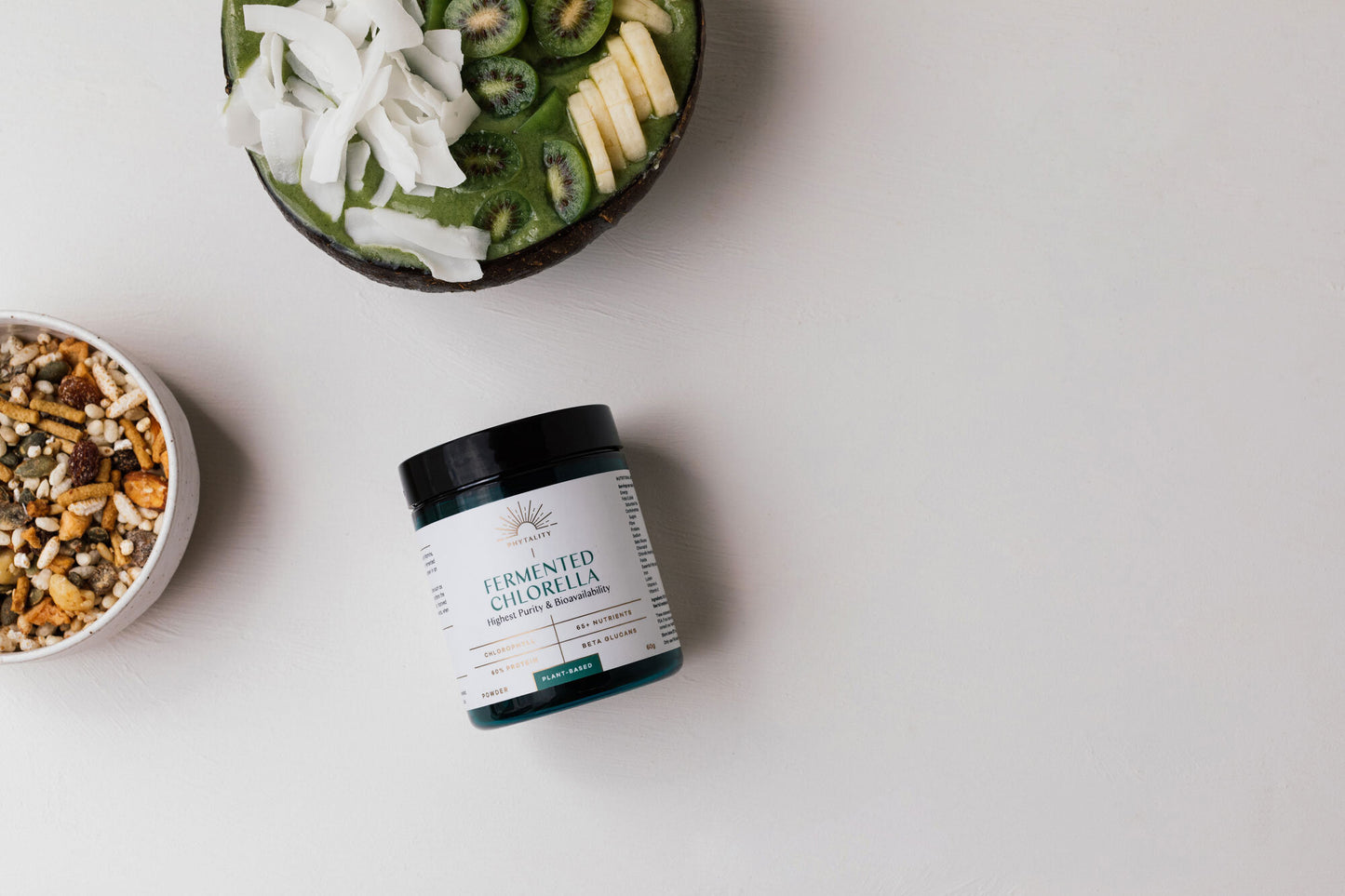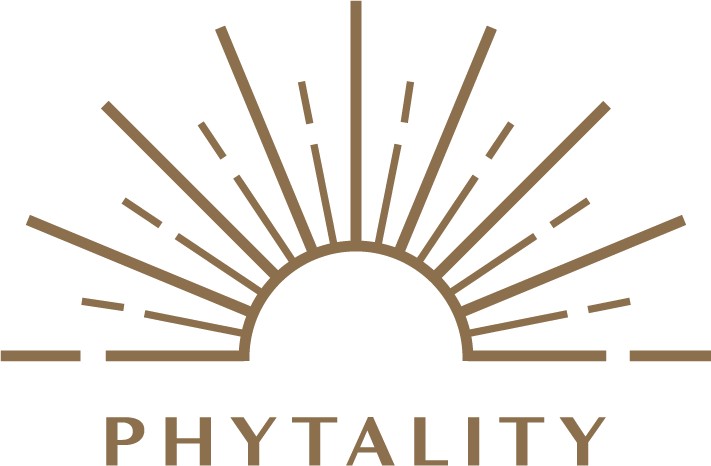
Chlorella is a serious contender for the world’s most nutritious food. It’s a fresh-water algae with an unusually nutrient-dense combination of protein, vitamins, antioxidants, and healthy fats. In fact, so health-giving is chlorella, that it’s now the most health popular supplement in Japan.
But what few are talking about, is the way in which chlorella is produced and brought to the market.
In the quest to produce cheap mass market products, have the majority of the world’s producers created something of dubious purity?
We talk to Phytality founder Mark Pages about why the brand has worked hard to solve this problem.
What is the Cleanest & Purest Chlorella Supplement?
The cleanest chlorella supplement is one that is grown in a closed-loop bioreactor and is fermented for optimum nutrient absorption. This method circumvents the contamination issues commonly associated with chlorella grown in open ponds. To our knowledge, Phytality is therefore the only chlorella in the world that conforms to these standards.
Phytality's chlorella is the purest supplement available in the UK for the following reasons:
- Closed-Loop Bioreactor: Unlike open ponds, Phytality uses a closed-loop bioreactor system, which is a series of glass tubes that eliminate the risk of environmental contamination.
- Controlled Environment: The bioreactor allows for complete control over the growing environment, including air and water quality, ensuring that the chlorella produced is uncontaminated.
- High-Quality Water Source: The water used in the bioreactor is carefully chosen and monitored to be free from contaminants, unlike the often polluted water sources used in open pond systems.
- Fermentation Process: Phytality utilises a fermentation method to break down the chlorella's tough cell wall, as opposed to mechanical methods that can degrade nutrient quality.
- Nutrient Preservation: The fermentation process maintains the integrity of the chlorella cell wall, which helps to preserve the nutrient content and prevents oxidation.
- Enhanced Bioavailability: Due to the fermentation process, Phytality's chlorella offers close to 100% absorption of key nutrients, significantly higher than other methods.
- Quality Assurance: Phytality's production method is tailored to produce chlorella of the highest quality, aiming for maximum purity and nutrient preservation.
Where does the purest chlorella come from?
The purest chlorella comes from indoor systems, called bioreactors, not open ponds.
“The vast majority of chlorella that you’re going to find in supplements in your local health food store is grown in open concrete-lined ponds’ explains Mark Pages, MD of Phytality.‘
And the vast majority of these ponds are in China. So in these scenarios there is no way to control the ambient air, meaning if it is near any factories or industry this can blow right into the ponds, depending on whether the wind is blowing north, south, east or west.
In addition, the water sources which feed the ponds are often contaminated. Whether they’re fed by fresh water or bore holes, much of the water supply in China contains contaminants at a parts per million that you simply do not want in your body.
‘With Phytality, we are never going to produce an algae from an open pond for this very reason. We want to ensure there can be no contamination from the air or the water and, by this logic, open ponds are an extremely imperfect way to produce a health food. Instead, we use the more expensive method which is called a ‘bioreactor’. This is a large series of glass tubes where we can ensure that the algae is grown within a closed loop, thus ensuring the end result is clean and absolutely pure. We can then control the environment completely, ensuring the end product is second to none.’
What about Fermented Chlorella vs. Broken Cell Wall?
'In our quest to make the best chlorella product on the market', Mark Pages explains ‘we looked deeply into ways in which the fairly indigestible cell wall of the chlorella plant can be improved. Did you know chlorella has the hardest cell wall in the entire plant kingdom! Now the common way to do this is via pulverization or by using sound waves. While many producers would have you believe that this method is optimum, the fact is that cell walls are not designed to be mechanically ruptured, and especially where you have a cell with a high fatty acid lipid content, this opens up the lipids to oxidisation (degrading its content). So we quickly concluded that a careful fermentation was the optimum way to help release the goodness of chlorella whilst keeping the nutrients sealed in a single cellulose cell wall.'
What should I look for when buying chlorella?
"To really get the best, you should look for a bio-reactor grown chlorella product, which has been fermented", explains Mark Pages.
‘Approximately 30% of the chlorella market is just straight chlorella, with an unbroken cell wall. These people are essentially getting zero absorption of key nutrients.
Then approximately 65% is cracked cell wall which means users are getting potentially 20 to 30% access to the nutrients within the cell, though a lot of the nutrients will have degraded through oxidisation as the insides of the chlorella cells no longer have the protection of the outer wall.
Perhaps 5% is what is called pulverised meaning there is a higher degree of nutrient bioavailability, but then it has an oxidised or degraded lipid profile (the nutrients will have lost value or started to "go off").
As far as we know, we are one of the very few producers in the world producing fermented chlorella that comes from a closed loop bioreactor. We are offering close to 100% absorption of the key nutrients when someone takes our product.
What is the most absorbable Chlorella?
The most absorbable chlorella, based on our testing, is a fermented product, as opposed to broken, cracked or pulverised.
Phytality use a process called heterotrophic fermentation. It is a process similar to brewing beer where you put in the Chlorella and you put in your nutrients and the chlorella absorbs those nutrients and starts growing, it is like a fermentation process, but you are using nutrients that support cell division. I'm confident this is the best way to produce chlorella of the highest quality.
What Should I Look for When Buying Chlorella?
When purchasing chlorella supplements, it's crucial to consider several factors that contribute to the product's quality, purity, and effectiveness. Here is a guide to assist you in making an informed decision:
- Source of Production: Pay attention to where the chlorella is grown. Products sourced from reputable locations with stringent quality control measures are generally more reliable. Be wary of chlorella grown in open ponds, especially if the origin is a region known for environmental pollution.
- Production Method: Look for chlorella that is grown in controlled environments like closed-loop bioreactors. This method significantly reduces the risk of contamination from air and water.
- Cell Wall Treatment: Chlorella has a tough cell wall that needs to be broken down for better nutrient absorption. Check if the product uses a safe and effective method for this, such as fermentation, rather than mechanical means that could degrade the nutrient content.
- Bioavailability: The efficacy of a chlorella supplement is closely related to how well the body can absorb its nutrients. Opt for products that offer high bioavailability, often indicated by terms like "fermented" or "highly digestible."
- Purity and Contaminant Testing: Ensure that the product has undergone rigorous testing for contaminants like heavy metals, pesticides, and harmful microorganisms. Certificates of Analysis (CoA) from third-party labs are a strong indicator of product purity.
- Ingredient List: Examine the ingredient list to ensure that the product doesn't contain fillers, artificial preservatives, or additives that could dilute its efficacy.
- Packaging: Quality chlorella supplements often come in dark, opaque bottles to protect the product from light and moisture, which can degrade its nutrient content over time.
- Customer Reviews and Recommendations: While not a definitive measure of quality, customer reviews and professional recommendations can provide valuable insights into the product's effectiveness.
- Price vs Quality: While it's tempting to opt for cheaper products, high-quality chlorella often comes at a premium due to the cost of maintaining purity and nutrient density.
